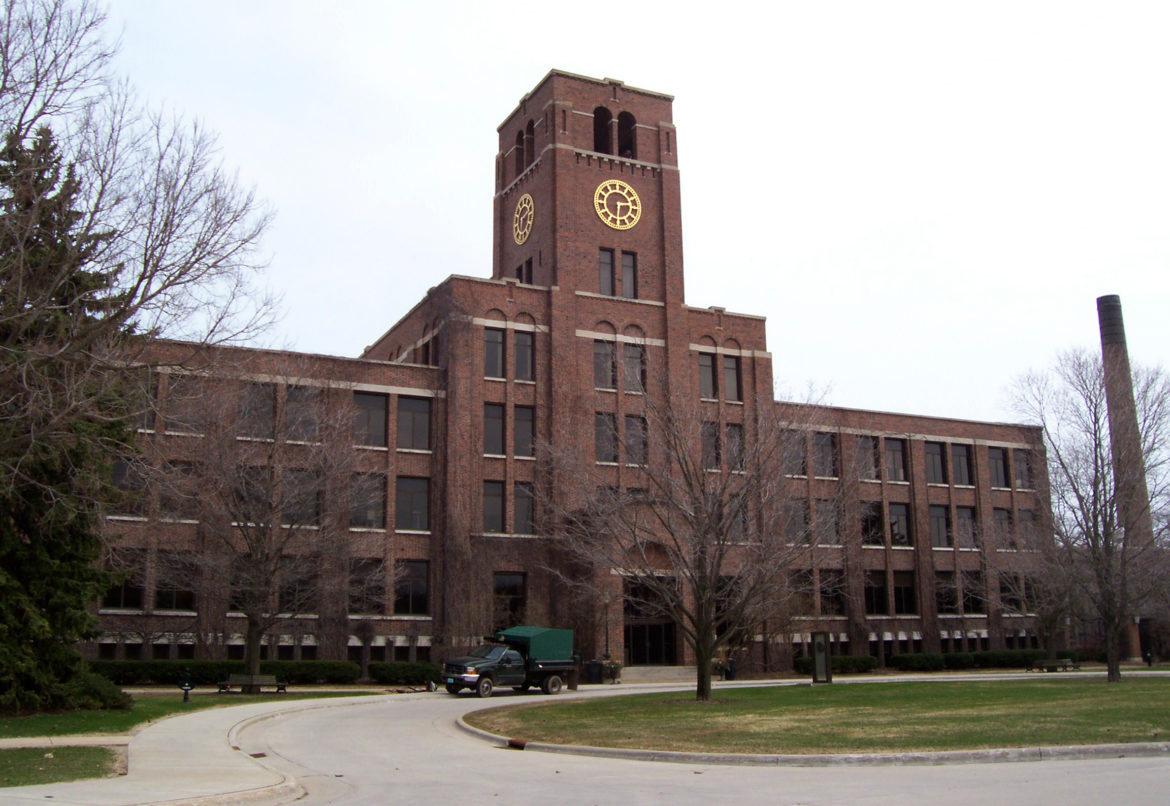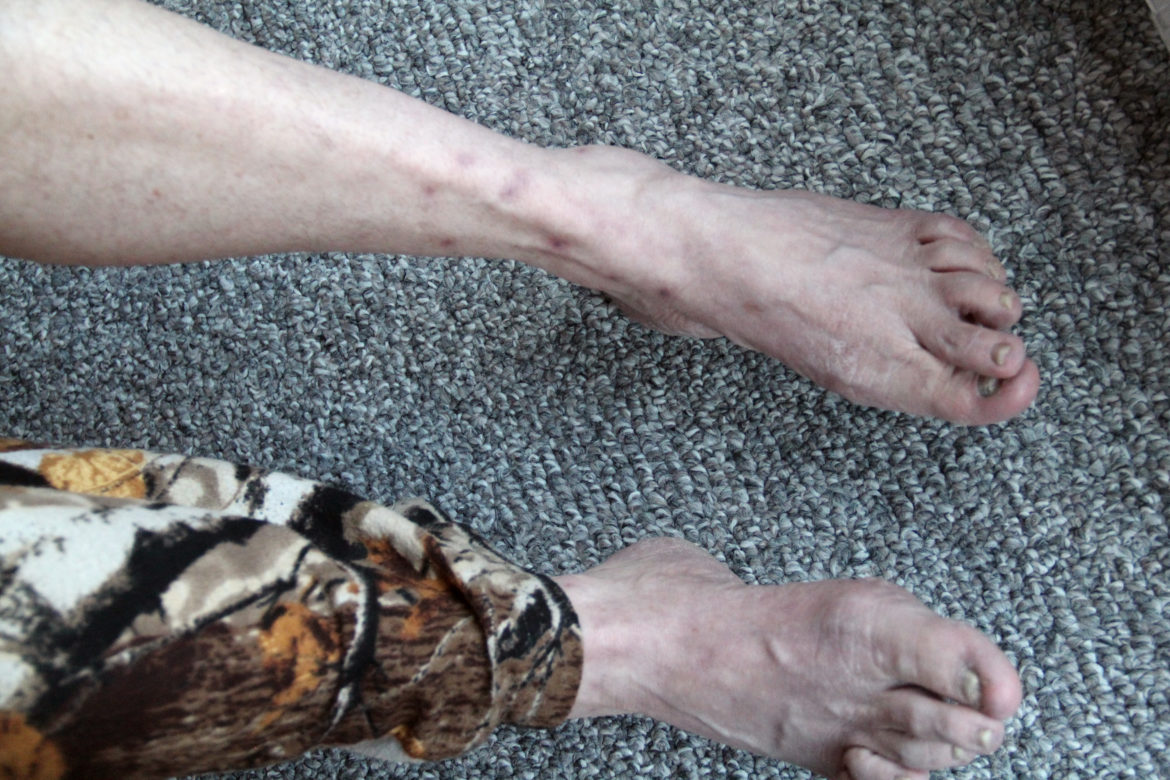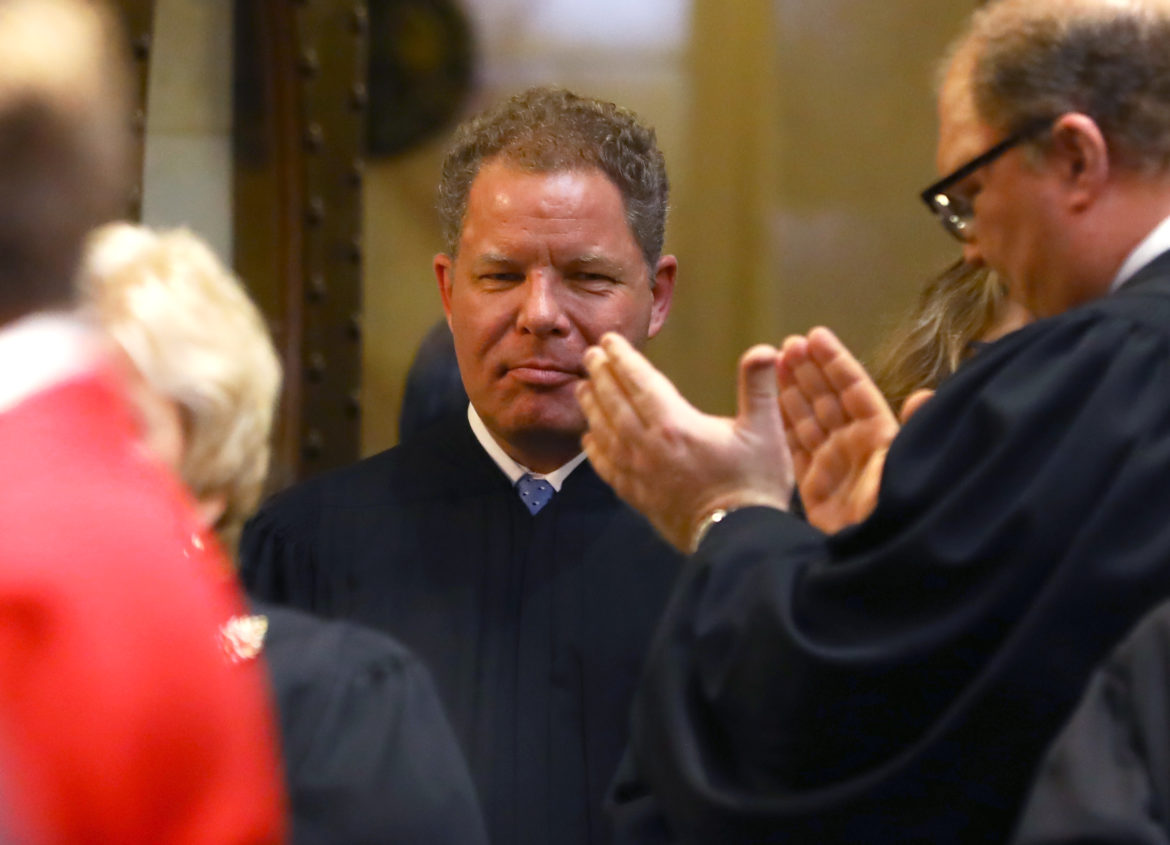Fewer Injured Workers Getting Compensation
Study shows Walker appointees overwhelmingly favor employers in workers comp cases.

Richard Decker worked for more than 35 years for Kohler Co. before a brain injury sustained at work in 2010 forced him to stop working. Decker, seen here with his wife, Cathy, has problems with short-term memory and severe pain. Kohler has refused to provide him with long-term support under worker’s compensation for the injury, and a state commission sided with the company. Photographed May 5, 2017 at the Deckers’ home near Cedar Grove, Wis. Photo by Alexandra Hall/WPR/Wisconsin Center for Investigative Journalism.
Richard Decker’s job involved heavy lifting and standing in conditions that were sometimes too hot for his co-workers at the Kohler Co. But Decker did not mind. He loved to work.
Decker’s 36-year career as a manual caster at the kitchen and bath fixtures company in Kohler, Wisconsin, ended after a workplace accident in which an 80-pound commercial-grade toilet fell on his head, knocking him unconscious and causing a brain injury.
For months after the Sept. 15, 2010 incident, Decker tried to return to work. But dizziness, excruciating headaches and neck and back pain made it impossible. By January 2012, Decker’s specialist, neurosurgeon Dr. Spencer Block, found he was unable to perform any meaningful work.
Another physician who examined Decker, neurologist Dr. John Broderick, wrote that he was “likely the most dedicated patient I have met as far as working towards returning to his work place.” Nevertheless, Block, Broderick and two other doctors he was referred to by his primary care physician concluded Decker had suffered permanent physical, neurological and psychological effects from the 2010 accident that keep him from working.

Richard Decker shows where a commercial-grade toilet fell on his head in 2010. Decker filed for worker’s compensation for the injury, eventually appealing the decision to the Labor and Industry Review Commission. The commission ruled against his doctors and for Kohler Co.’s doctors, who found Decker had fully healed from the injuries. Decker — who takes morphine for his pain, has developed a stutter and suffers from short-term memory loss — is receiving Social Security disability payments. Photo by Alexandra Hall / WPR/Wisconsin Center for Investigative Journalism.
These days, Decker, 63, takes morphine to ward off bouts of excruciating pain. He has a hard time remembering things that have just happened. Decker stutters, often struggling to remember what he was talking about. He cries at the least provocation. Decker said he is often too embarrassed to leave the home near Cedar Grove in Sheboygan County that he shares with his wife, Cathy, who also worked at Kohler for nearly 20 years.
And while he receives Social Security disability payments — less than half of his former pay at Kohler — the state of Wisconsin has denied Decker worker’s compensation for the ongoing symptoms. If he had been declared permanently and totally disabled, Decker could have received a portion of his pay plus health care related to his injury for the rest of his life from Kohler.
After a 2013 hearing, an administrative law judge found Decker “credible,” ruling in 2015 that he was permanently and totally disabled. But in 2016, Gov. Scott Walker’s three-member Labor and Industry Review Commission denied worker’s compensation beyond Dec. 15, 2010 — three months after the accident — siding with Kohler and the doctors it hired to examine him.

Richard Decker, long-time employee of the Kohler Co., headquarters seen here, sought compensation after an 80-pound toilet fell on his head in 2010. After a long contested case, doctors hired by the company convinced a state panel that Decker’s injury had healed in a matter of months. He feels the company abandoned him. The Kohler, Wis.-based company says it followed the law and Decker was treated fairly. Photo by Royalbroil via Creative Commons.
Physicians on both sides of the case agreed Decker had suffered from post-concussion syndrome. But the Kohler-hired doctors disputed the severity of his injuries, contending after examinations in 2012 that he had fully healed. Any problems, they argued, had stemmed from a 2005 back injury and surgeries. Those doctors concluded Decker’s continuing symptoms were primarily in his mind.
After nearly six years, the commission awarded Decker money for the 2005 back injury — but not the 2010 blow to the head.
“Not in a million years did we think it would get overturned, not after what he went through,” Cathy Decker said as they sat at the dining room table of their rural, ranch-style house, rifling through stacks of paperwork related to Richard’s worker’s compensation claim and medical bills. “He was in a brain treatment center for five months, for cripes’ sake.
“His doctor said he can’t go back to work because he can’t, well, you see how he is,” she added, speaking to a reporter. “He can’t sit. He can’t stand without having pain on a regular basis. You know, just his mental condition …”

Richard Decker’s feet sometimes curl with painful cramps, caused, he says, by a brain injury he suffered in 2010 while working at the Kohler Co. Decker’s request for worker’s compensation for the injury was denied in 2016 after a long administrative battle. Photo by Alexandra Hall / WPR/Wisconsin Center for Investigative Journalism.
In a report to the Deckers’ attorney, Charles Domer, Broderick wrote: “I find it disheartening and shameful that such a large and proud corporation such as Kohler would go to great lengths to deny benefits, support and future compensation to someone who has given so much of his life to them.”
In a statement to the Wisconsin Center for Investigative Journalism, the company said Decker was treated fairly.
“Kohler has acknowledged Mr. Decker’s worker’s compensation claim and provided him with an appropriate and fair level of benefits per state of Wisconsin statutes,” the statement read. “Kohler appreciates Mr. Decker’s years of service, for which he has received compensation and benefits, including a defined benefit pension that rewards his length of service to the company.”
There are some indications that injured workers like Decker are losing ground. One lawyer’s study concluded that decisions overwhelmingly favored employers after appointees of Wisconsin’s pro-business Republican governor took full control of the Labor and Industry Review Commission in late 2013.
And a Center review of agency statistics shows the percentage of administrative law judges’ decisions appealed to the LIRC has more than doubled over 10 years, from 29 percent in 2007 to 59 percent in 2016.

Richard Decker is seen at his son’s wedding in September 2007. In 2010, Decker was injured while working at the Kohler Co., when an 80-pound toilet fell on his head, causing a brain injury. Decker currently is in excruciating pain, has a hard time remembering things that have just happened, stutters, and cries at the least provocation.
“What they did between that period of time has really tilted the scales in favor of the insurance companies and employers in a very significant way,” said Luke Kingree, a worker’s compensation attorney who practices in Eau Claire and Madison who did the study covering decisions between 2014 and 2016.
LIRC Chairwoman Georgia Maxwell responded in an email that “there is no ‘appropriate’ or ‘fair’ distribution of results between applicants and respondents in worker’s compensation cases, nor should anyone attempt to divine one. Each case rises and falls on its individual merits, after due consideration of the factual record and the law applicable to the case.”
Yet Kingree’s findings align with a prediction by William Sachse, a Milwaukee attorney who represents employers. He told a business group in 2013 that the addition of the Walker appointees to the LIRC “could make its decisions friendlier to employers.”
For Decker, the decision denying him worker’s compensation feels like a betrayal.
“I had supervisors, superintendents come up to me and say, ‘Richard, I wish I had a hundred more men like you.’ You know? Guys at work would say, ‘Are you foolish? Working all those heat days, that overtime?’
“And I just really deeply thought in my heart that if something would ever happen, that they would take care of good workers. I really honestly believed that.”
‘Grand bargain’ protects workers, employers
Wisconsin has a long history when it comes to worker’s compensation, becoming the first state to have a worker’s compensation program upheld by its state Supreme Court in 1911. According to the Department of Workforce Development, the aim of the law is to “require an employer to promptly and accurately compensate a worker for any injury suffered on the job, regardless of the existence of any fault or whose it might be” in exchange for limiting the amount of money a worker could recover.
Worker’s compensation is often called “the grand bargain” in which employers assume responsibility for workplace injuries. In exchange, workers in most cases cannot sue for damages — such as pain and suffering — that go beyond medical expenses. The insurance carrier or self-insured employer is supposed to cover not only medical expenses but also wages lost during the time the worker is injured.
In Wisconsin, private companies provide worker’s compensation insurance to employers. The Department of Workforce Development’s function is to mediate disputes that arise, make sure employers and workers follow the law and help applicants navigate the system.
DWD says it receives about 30,000 worker’s compensation claims per year. Roughly 5,000 are contested and scheduled before an administrative law judge, according to DWD spokesman John Dipko.
All but a few hundred cases each year are settled before the case gets to a hearing, usually “at the courthouse steps,” said B.J. Dernbach, former administrator for the DWD’s Division of Worker’s Compensation who now is the administrator of the agency’s operations division.
In 2016, Wisconsin saw 5,184 injured workers apply for hearings to mediate disputes. Of those, 93.4 percent were settled, DWD said.
Wisconsin’s high settlement rates have earned it a top spot among states nationally, meaning the system is working well, Dernbach said.
Dozens of other states have chipped away at benefits for injured workers in an effort to reduce the cost for employers, whose worker’s compensation insurance premiums are based in part on how much they pay out in claims.
A 2015 ProPublica and NPR investigation found that since 2003, legislators in 33 states had passed laws that cut benefits for injured workers or made it harder to get them “under the false premise that costs are out of control.”
In fact, the investigation found employers are paying the lowest rates for worker’s compensation insurance since the 1970s. Unlike many other states, Wisconsin actually slightly increased benefits for injured workers by raising the amount of wage replacement, the investigation found.
Study: Panel employer-friendly

Attorney Luke Kingree studied the Labor and Industry Review Commission after appointees for Gov. Scott Walker took full control of the body, which hears worker’s compensation appeals. He found that from July 2014 to June 2016, the LIRC “tilted the scales in favor of the insurance companies and employers in a very significant way.”
Kingree, the attorney who conducted the Wisconsin study, looked at whether decisions from the LIRC, which handles worker’s compensation appeals, had changed since Walker appointees took control in late 2013. He reviewed 252 case decisions issued by the LIRC between July 2014 and June 2016 — many of them, he said, by employers seeking to reduce or overturn benefits awarded by judges.
These 252 cases raised 181 “significant” issues, Kingree said, including whether the injury was caused at work, the extent and duration of the injury and the benefits to which the worker is entitled. Focusing on those issues, Kingree said he found the commission reversed rulings by judges that favored employers just 1 percent of the time while reversing decisions favoring workers 38 percent of the time.
Kingree said his review of the cases showed the LIRC often adopted the opinions of “independent medical examiners” hired by the employers or their insurers — who sometimes did cursory physical examinations or just a review of medical records — over physicians who had treated the injured workers.
Among the cases he reviewed were more than a dozen that “almost broke my heart to read them,” said Kingree, who used to represent employers but now exclusively represents injured workers.
“I consider myself to be relatively fair-minded and even-keeled, but I found their decisions in these 15 or 20 cases to be completely, clearly incorrect where they sided with these (independent medical examiner) doctors against the injured worker,” he said.
Since Kingree presented his study at the 2016 Wisconsin Association of Worker’s Compensation Attorneys meeting, lawyers have told him the commission appears to be moderating its stance toward injured workers.
Maxwell, who has served stints as a high-level administrator at DWD and the Department of Financial Institutions, took over as LIRC chairwoman in November. She defended the panel’s decisions, saying they are publicly available and “speak for themselves.”
“Judging by the exceedingly high percentage of cases where the commission’s decisions are affirmed following judicial review, the commission is confident that its review of worker’s compensation cases over the last several years has been both factual and legally sound,” she said.
Meanwhile, Wisconsin is taking a harder line against suspected worker’s compensation fraud.
Beginning in 2016, DWD partnered with the state Department of Justice to add a dedicated prosecutor for worker’s compensation cases. According to Dipko, the prosecutor focuses on all types of fraud and abuse, ranging from workers “faking injuries” to doctors overbilling the system.
DWD also has made it easier for the public to report suspected fraud through its website. Dipko said he believes these measures have a deterrent effect on cheating.

Georgia Maxwell is the new chairwoman of Wisconsin’s Labor and Industry Review Commission. One study found LIRC decisions tilted strongly toward employers in worker’s compensation appeals between 2014 and 2016. Maxwell says each decision is based on the facts of the case and “there is no ‘appropriate’ or ‘fair’ distribution of results between applicants and respondents.” A former deputy secretary at the Department of Workforce Development, Maxwell is seen in August 2017 participating in an apprenticeship event in Hartford, Wis. Photo from the Department of Workforce Development via Facebook.
But Kingree said he has seen little fraud by workers during his 10 years practicing worker’s compensation law on both sides of such disputes. Most people just want to get back to work, he said, and at a maximum of two-thirds of pay while healing from a work injury, “Nobody gets rich on worker’s comp in Wisconsin.”
Case highlights gap in coverage
In late June, the state Supreme Court denied an appeal from a Chippewa Falls Walmart employee injured at work in 2013. Tracie Flug said she relied on her doctor’s advice to get spinal surgery after she strained her right arm and shoulder while scanning items on a high shelf.
After the surgery, Walmart’s physician — who never examined Flug — contended the procedure was designed to fix not the strain but a pre-existing back condition. The spinal fusion left Flug with a permanent partial disability. Her efforts to qualify for worker’s compensation had been denied by the LIRC.
A split Wisconsin Supreme Court upheld those decisions.

Wisconsin Supreme Court Justice Daniel Kelly wrote the opinion denying worker’s compensation for a woman who was left partially disabled after a surgery her doctor recommended to correct a workplace injury. He ruled Tracie Flug’s surgery corrected an earlier problem — not the workplace injury. Kelly is seen here at the State of the State address in Madison, Wis., on Jan. 10, 2017. Photo by Coburn Dukehart / Wisconsin Center for Investigative Journalism.
“In the general scheme of the program, medical expenses and disability benefits are payable only when they are attributable to a qualifying injury,” said Justice Daniel Kelly, writing for the 4-3 majority.
But dissenters, including Chief Justice Patience Roggensack, said the majority ignored the portion of the law requiring that when an injured worker receives treatment “in good faith” — and the treatment is “unnecessary” yet “medically acceptable” — the employer must pay worker’s compensation for any resulting disabilities.

Wisconsin Supreme Court Chief Justice Patience Roggensack wrote that an injured worker who was partially disabled by surgery following a workplace injury should be compensated for that disability. Roggensack was on the losing end of that 4-3 decision, which denied worker’s compensation to Tracie Flug. Roggensack is seen here at the State of the State address in Madison, Wis., on Jan. 10, 2017. Photo by Coburn Dukehart / Wisconsin Center for Investigative Journalism.
Flug’s attorney, Jeff Klemp, said his client is back at work at Walmart, has gotten a promotion and prefers not to talk about the case.
Klemp said he had at least two other cases in which the LIRC sided with employers, ignoring important medical evidence presented by his clients’ personal physicians. In one case, he said, a woman was fired from her job of 25 years and could not afford the treatment she needed to correct the workplace injury.
“A lot of my clients did vote for (Walker) because they wanted efficient government,” said Klemp, who practices in Eau Claire. “Our governor would do well if he tasked his appointees with making sure we have a properly functioning safety net for the very people who voted for him.”
He added, “Worker’s comp is pretty ugly now. It’s not because of waste, fraud or abuse.”
‘Bad faith’ findings rare
Dixon Gahnz, president of Lawton and Cates law firm in Madison, said there is not enough deterrence to keep insurance companies from taking advantage of injured workers by unfairly denying their claims. He added that some independent medical examiners hired by employers or their insurance companies tend to favor employers by routinely declaring injuries to be non-work related.
But so-called “bad faith” is “difficult to prove because you have a doctor who is licensed in Wisconsin who is swearing under oath that this person’s injury was not work-related,” Gahnz said.
The penalty for a bad faith denial by an insurer is $30,000 for each instance, or three times the amount owed to the injured employee, whichever is less. Dipko said among the roughly 30,000 worker’s compensation claims in 2016, 25 insurance carriers and employers in the state were penalized a total of $303,000 for bad faith denial of coverage.
Gahnz said worker’s compensation insurance carriers can afford to drag out cases until claimants run out of money.
“I know that there is a lot of crowing that this is one of the better systems in the country,” Gahnz said, “but you’re not going to hear that from the injured workers.”
After the mishap, Templin continued to have problems with her knee. She was diagnosed with a torn meniscus and had surgery in August 2015, after which she filed for worker’s compensation to cover “several thousand dollars” in medical costs and lost wages.
Soon after, Templin was told to get a second opinion from a Madison physician approved by the insurance company. This second doctor determined the injury was not work related, and that the meniscus tear was from a pre-existing condition.
“My wife’s surgeon laughed when he saw the report. He said, ‘Where is this coming from?’ ” Bob Templin said.
For the Templins, no settlement was offered. They had faith that the system would work for injured workers, and represented themselves in front of an administrative law judge.
“Everything went by the letter. I give the attorney for the insurance company credit, he knew the rules and he knew how to play the game and he kicked our butt, he did his job,” Templin said.
“If that is what the system is designed for, then the system works quite well. If the system is designed to be fair and equitable to injured employees, it fails miserably, in my opinion.”
Reporters Cara Lombardo and Eden Foster contributed to this story, which was produced as part of an investigative reporting class in the University of Wisconsin-Madison School of Journalism and Mass Communication under the direction of Dee J. Hall, the Wisconsin Center for Investigative Journalism’s managing editor. The nonprofit Center (www.WisconsinWatch.org) collaborates with Wisconsin Public Radio, Wisconsin Public Television, other news media and the UW-Madison School of Journalism and Mass Communication. All works created, published, posted or disseminated by the Center do not necessarily reflect the views or opinions of UW-Madison or any of its affiliates.
-
Legislators Agree on Postpartum Medicaid Expansion
 Jan 22nd, 2025 by Hallie Claflin
Jan 22nd, 2025 by Hallie Claflin
-
Inferior Care Feared As Counties Privatize Nursing Homes
 Dec 15th, 2024 by Addie Costello
Dec 15th, 2024 by Addie Costello
-
Wisconsin Lacks Clear System for Tracking Police Caught Lying
 May 9th, 2024 by Jacob Resneck
May 9th, 2024 by Jacob Resneck






















It is these types of issues that have powerful impact on the residents of Wisconsin that voters are rarely aware of when going to the polls. Perhaps the pre-election ads should focus on these and similar topics that have such life changing consequences.
First, they stuck it to the blacks, but I wasn’t black and didn’t know any black people, probably didn’t like them anyway. Then, they stuck it to the public sector unions, but, hey, those are my tax dollars paying these lazy teachers and government workers, so too bad for them. Then, they stuck it to the immigrants, but I didn’t know any of these Mexican immigrants, and didn’t they say that they were sending the worst people, and, anyway, the law is the law. Then, they went after the Muslims, I don’t know any of them, but they seem to hate us, so you can’t be too safe. Then they stuck it to the liberals, but that was okay, because I hate them anyway, always acting superior and making us feel like racists.
And now they’re sticking it to white workers. I knew that Wisconsin was” open for business,” but this is a little close to home. Maybe it’s all fake news and liberal lies. We have to trust someone, right? I hope so, because who is there left to stand up for us, the hard working, tax paying, real Americans who put this government in office?
Unions are the answer, always have been… That’s why the Republicans have destroyed any protections the Unions had to operate… Working men should know their History, and all the people who have died trying to get the Working Man a Fair Deal